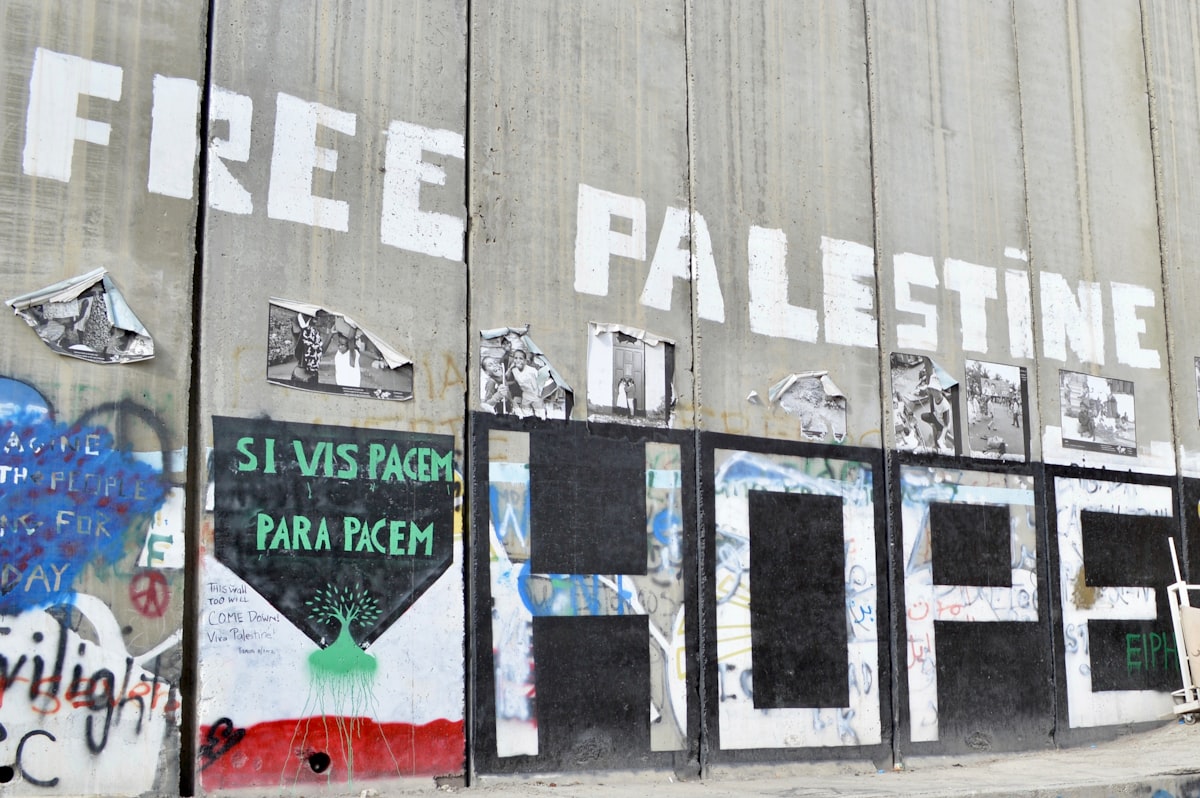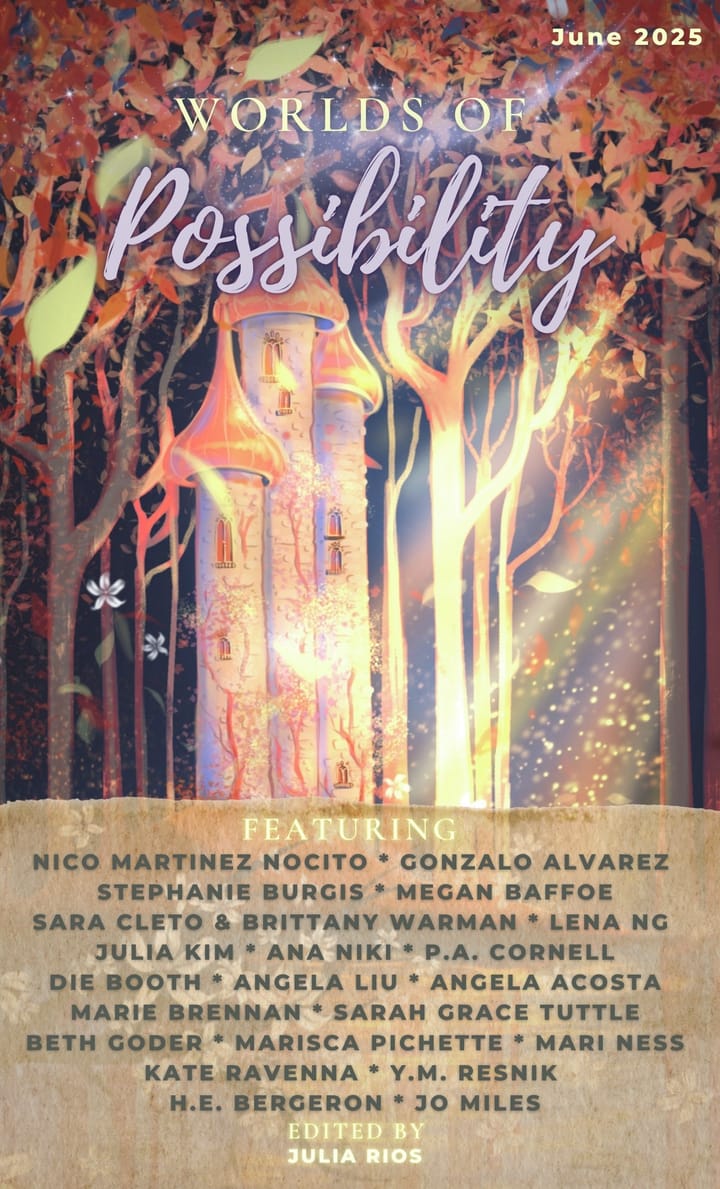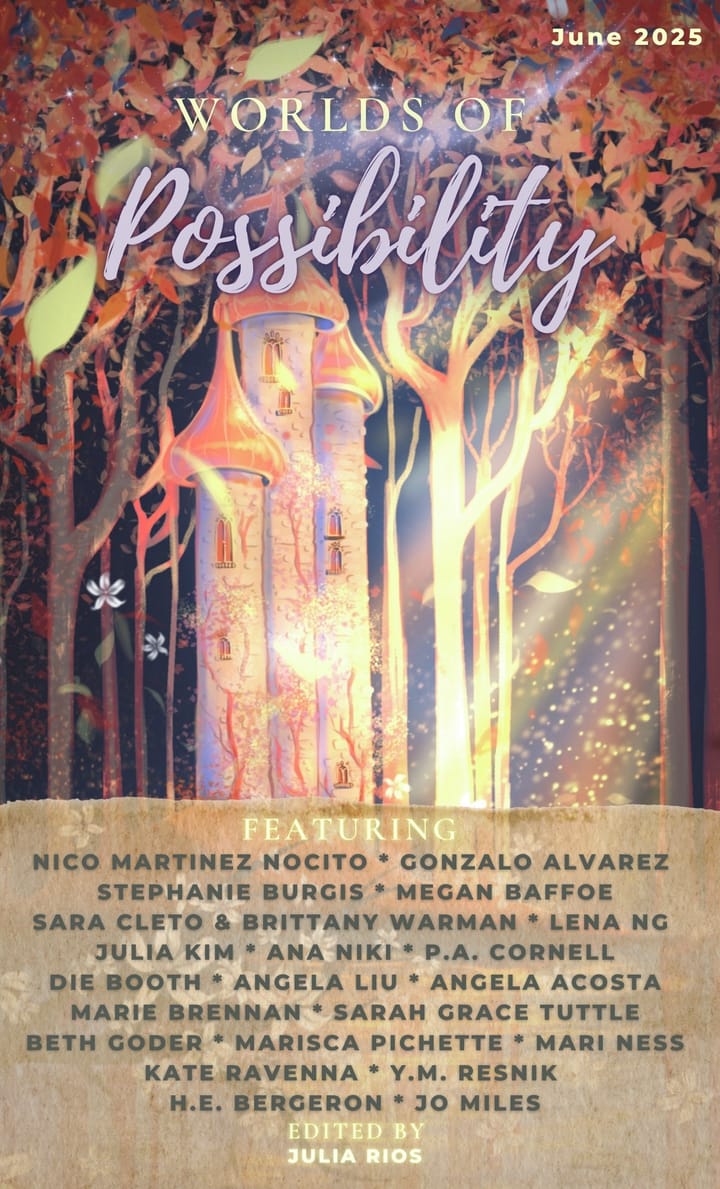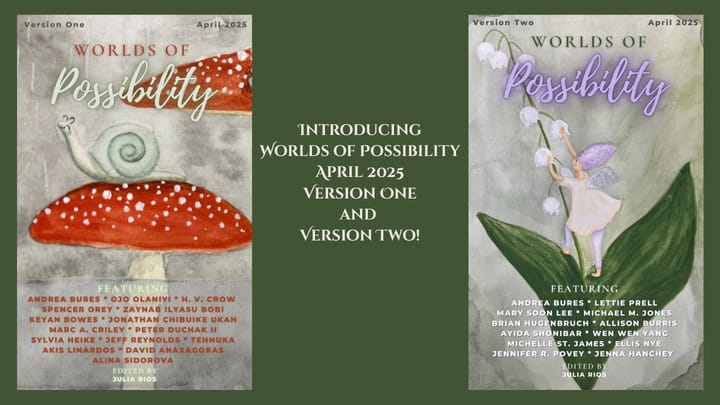Unlearning Myths, Learning Solidarity: My journey to calling for a ceasefire and Palestinian freedom - an essay by Laura Mandelberg
This essay is part of the December 2023 issue of Worlds of Possibility. The ebook of the entire issue is available to download for free as an end of the year gift.

This essay is part of the December 2023 issue of Worlds of Possibility. The ebook of the entire issue is available to download for free as an end of the year gift here: https://www.juliarios.com/the-december-2023-issue-of-worlds-of-possibility/
Unlearning Myths, Learning Solidarity: My journey to calling for a ceasefire and Palestinian freedom
By Laura Mandelberg
A few weeks ago, while trying to process Israel’s ongoing genocidal onslaught against Palestinians in Gaza, I picked up the book A Land With A People: Palestinians and Jews Confront Zionism. I found all of the essays, poems, and artwork powerful, but when I got to Tzvia Thier’s essay, “Seeing Zionism At Last,” I did a double-take: because Tzvia was the principal of the first Hebrew school I ever attended as a child in the early ‘90s.
She was one of the first people who taught me the myths about Israel that I later had to unlearn as an adult - and that she herself unlearned in her sixties, when she finally interacted with Palestinians for the first time and realized that they were not dangerous, as she had always been taught, but were in fact suffering under Israeli oppression.
Tzvia and her daughters, and later other Hebrew school teachers, taught me a version of Israeli history that completely erased the existence of Palestinians. We celebrated Israeli Independence Day, but never learned that the state of Israel was founded on the Nakba (“catastrophe” in Arabic): the violent displacement and dispossession of 700,000 Palestinians from their native land. In fact, no one used the word “Palestinian” at all: we were taught that the land that would become Israel was mostly empty, with only a handful of “Arabs” living there, and that it was a barren, lifeless desert until Jews came along, planted trees, and made the desert bloom.
What I didn’t learn until I was an adult was that Israel has been engaging in ecological destruction for its entire existence: uprooting olive trees, planting invasive trees that are vulnerable to wildfires, and poisoning and demolishing Palestinians’ wells, not to mention the environmental impact of repeatedly bombing Gaza. Israel’s environmental violence against Palestinians follows a long tradition of settler colonial states trying to destroy Indigenous peoples’ connection to the land: for example, the US Army’s slaughter of the buffalo population that was the main food source for Plains Indians in the late 1800s.
Everything I learned from my Jewish community growing up reinforced the idea that Israel was our home - or at the very least, a necessary backup plan in case we ever needed to flee antisemitic violence. I don’t remember learning anything about Palestinian history or perspectives in public school, either. Criticism of Israel as a Jewish ethno-state was so rare, if not entirely absent, that I had no idea it was even an option until I was in college.
And there, where I should have started to unlearn the propaganda I grew up with, it was instead reinforced by Zionist campus groups that cynically preyed on my generational trauma as a granddaughter of Holocaust survivors and convinced me that Palestinians were dangerous and taught their children to hate Jews. Even once I started to unlearn the most egregiously racist myths about Palestinians, it took me years to understand that they were facing oppression. I believed the lie, so common in mainstream American media, that this was centuries-long religious conflict between two sides who irrationally hated each other. That it was complicated, something I couldn’t fully understand without a degree in history, religion, or foreign policy, rather than a clear-cut case of a settler colonial apartheid state brutally oppressing a stateless refugee population.
I’m still not sure exactly how I came around to understanding that the situation in Israel/Palestine was not a “conflict,” but an oppressed group fighting for their freedom from a highly militarized state founded with the help of British imperialism and backed by massive US funding. I’m not sure how I came to realize that Jewish people, while oppressed in many contexts both historically and currently, could also be oppressors when wielding state power. There was no particular turning point that I can remember; it took years of reading, paying attention to the news, listening to Palestinians, and listening to writers and organizers from a variety of marginalized backgrounds about the parallels between their people’s experiences and Israel’s oppression of Palestinians. I desperately wish I could distill those years of learning into one set of magic words that I could use to bring along the many people I care about who are still unwilling or unable to see the power dynamics behind all the violence.
When they say things like, “It’s not a war crime to bomb a hospital if there are tunnels underneath it,” or “The Nakba didn’t have to happen, if only the Arabs had accepted the partition,” or “Hamas is to blame for the deaths of Gazans, because they use human shields,” it breaks my heart. When they call me and my fellow anti-Zionist Jews “useful idiots for Hamas,” or say that the incredibly brave journalists documenting their people’s extermination in Gaza are “Russian trollbots,” or go on and on about how this can’t be a genocide because it’s so “complicated” and has been going on for “thousands of years,” it chills me to the bone.
I’ve even seen some people, in a stunning feat of DARVO tactics, claim that the worldwide protest movement for a ceasefire and Palestinian freedom is actually calling for the extermination of Jews. It’s unbearably painful to see my fellow Jews - many of whom are, like me, descendants of Holocaust survivors - justifying what is so clearly a textbook case of genocide against Palestinians.
At the same time, I recognize all of their talking points, because I used to believe them. I recognize the fear underneath their horrifying, inexcusable comments, because I used to feel that fear too. Even after I started to realize that Israel was committing atrocities, became involved with Jewish Voice for Peace and IfNotNow, and started attending protests against Israel’s regular massacres in Gaza, it took me a long time to unlearn some harmful myths about Palestinians: like the idea that the slogan “From the river to the sea, Palestine will be free” is a call to exterminate Jews, rather than a call for freedom, justice, and equality in the entire area where Palestinians lived before the Nakba. It took me a long time to fully internalize the truth that Palestinians were not a people constantly in danger of tipping into antisemitism, but that in fact their liberation was bound up with mine: as antisemitism, Islamophobia, and anti-Palestinian racism all stem from the same systems of white supremacy and colonialism.
Likewise, it took me years to fully understand that the root cause of all of the violence in Palestine/Israel was Zionism, the nineteenth-century European political ideology that says that there should be a Jewish state in Palestine. For so long, I battled the cognitive dissonance of knowing, intellectually, that an ethno-state that explicitly privileges one group of people in a land where another group of people was already living can only be inherently violent, while still believing, emotionally, that I needed Israel to exist as a Jewish state for my own safety. But after years of watching Israel commit the same horrific atrocities, over and over, and hearing more and more Jews speak out against Zionism as an ideology that doesn’t keep us safe, but in fact puts us in danger, I was finally able to let go of my fear-based emotional attachment to the idea of a Jewish state that had nothing in common with its reality.
An important part of the process of letting go of my illusions about Israel was holding space for all of the intense feelings that came up: shame, for believing so many racist lies for so long. Grief, for the soul of Judaism, and for the parts of my own humanity that were taken from me by the community that raised me to love a violent ethno-state and erase the very existence of its victims. Anger and betrayal, at that community and the propaganda machine that has been paid to influence its views for decades. Once I had worked through those feelings, I was finally able to accept in my heart what I already knew in my head: that the only truly just path forward is one secular, democratic state.
Contrary to many people’s fears, dismantling the structure of Israel as a Jewish state wouldn’t mean expelling or harming Israeli Jews in any way. They would just have to live side-by-side with Palestinians, under one government with equal rights for all - just like white South Africans did when their apartheid government was dismantled. If anyone would be at risk of violence, based on historical precedents, it would be Palestinians, not Jews.
Sometimes I feel a deep sense of despair watching the unspeakable atrocities that Israel is committing against Palestinians. I think about the immense trauma and loss that my grandfathers went through during the Holocaust, and how deeply it has affected every generation of our family - and I see even more severe trauma and loss happening to Palestinians, at the hands of my own people, and know in my bones that it will reverberate for generations. It breaks my heart that so many members of my own communities are still unable to condemn Israel’s violence or name it as genocide.
But then I think about Tzvia’s essay - if she could unlearn the Zionist propaganda that she spent her entire lifetime teaching, I have hope that anyone can. I think about the massive and growing movement, of both Jews and non-Jews, for a ceasefire and Palestinian freedom around the world. I think about all the people using art, music, poetry, voice acting, books, zines, food, and more to mourn the dead and fight like hell for the living.
Contrary to the myth that the Palestinian liberation movement is antisemitic, when I work for Palestinian freedom, I feel connected to my ancestors who suffered oppression, massacres, and genocide and wouldn’t want anyone else to live through the same horrors. I feel deeply rooted in my Jewish values - tikkun olam (repairing the world), pikuach nefesh (prioritizing the saving of lives above all else), tdzedek (justice). My heart is broken, and at the same time, I feel stronger in community with other Jews who also refuse to let Israel commit genocide in our names.
We’re transmuting the generational trauma that led so many members of our communities to prioritize Jewish safety above all else and turning our longing for safety outward, toward the entire world. We understand that, as Menominee organizer and journalist Kelly Hayes says, “to defend Palestine is to defend the world.” Every day, we’re laying the foundations of a true safety that doesn’t come at anyone’s expense - a safety based on justice, solidarity, and freedom from all forms of oppression.
About the Author
Laura Mandelberg is active in the Palestinian liberation and climate movements. She is particularly interested in the intersection of feelings, art, and social justice work. She is a dog lover and a stationery enthusiast, and loves reading sci-fi that envisions a better world and how we can build it. She lives in the Boston area.


